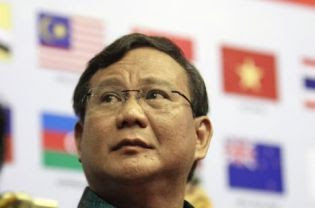 |
| Prabowo Subianto. (JG Photo/File) |
I took my own informal poll ahead of Wednesday’s gubernatorial election. As an expat, I can rarely be accused of having my finger on the pulse of the nation, but I asked friends, waiters, office workers, the odd taxi driver and my daughter’s nanny who they were going to vote for and Jokowi was the name I heard over and over.
“He’s a good man, simple. He’s real,” said an office colleague when I asked why she was casting her lot with Solo Mayor Joko “Jokowi” Widodo.
By contrast, the current governor, Fauzi Bowo, seemed almost a sad figure as he went through the race saddled with the disappointment of people who are sick of traffic, pollution and chaos and believe the governor ought to fix the city’s problems.
Backed by the ruling Democratic Party, Fauzi seemed like yesterday’s man, shrouded fairly or unfairly in the same air of indecisiveness and drift that has raised the hackles of many people against the current national leadership.
So the unofficial count of 43 percent for Jokowi to about 34 percent for the incumbent seemed about right, even if the conventional wisdom ahead of the election said Fauzi had the advantage in terms of name recognition and organization.
As the Sept. 20 runoff between the two comes into view, it is likely that Jokowi will have the momentum. One imagines he will easily get the support of voters drawn to the other reform-minded candidates, third-place Hidayat Nur Wahid, with about 12 percent, and independent economist Faisal Basri, who came in fourth with about 5 percent.
In the race against Fauzi, Jokowi has something going for him that actually matters in a democracy: he excites people and gives them hope. For now, it doesn’t matter that Jakarta itself may be basically ungovernable. Its problems — from street gangs to crowded roads to lack of clean water — run so deep into the fabric of an overstretched and long-mismanaged city that it is unfair to blame Fauzi for the lack of progress or to expect that Jokowi, should he win, will be able to fix things. It may be enough for now to give Jakarta’s citizens a fresh face and a new approach.
But of course, the race for the tough job of running Jakarta is much more than a local contest and the biggest winner on Wednesday was retired Gen. Prabowo Subianto, whose Great Indonesia Movement (Gerindra) party joined forces with Megawati Sukarnoputri’s PDI-P to back Jokowi and his running mate, ethnic Chinese politician Basuki Tjahaja “Ahok” Purnama. How odd. Suddenly the mantle of change, decisiveness and reform is on the shoulders of Prabowo. In the strange world of politics, this is starting to amount to a seismic shift.
The hard-man of 1998, Prabowo once symbolized the worst excesses of the New Order. An in-law of Suharto, a tough Army officer with a brutal reputation despite his blue-blood Javanese family, Prabowo was a man to be feared at home and ostracized abroad as an alleged human rights violator. His name as the former commander of the Special Forces was associated with kidnapping, urban riots and fears that he was trying to usurp the presidency.
But in one race, he has elevated himself above the other contenders for president while also leading recent opinion polls. By backing Jokowi, Prabowo puts himself in the camp of the downtrodden. And by engineering a ticket that includes Ahok in the No. 2 slot, he helps ease lingering fears that he is anti-Chinese. This latter point is crucial. When Ahok moved to Gerindra from the Golkar Party to join the ticket, it was a sign that Prabowo was serious about putting the minds of the Chinese community at ease.
Should this prove to be a harbinger of the 2014 presidential race, we can see the Prabowo approach quite clearly: First, align yourself with reform and populist sentiment. Then build the necessary bridges to the elite business community, which is dominated by ethnic Chinese, to secure the financial support necessary to make a campaign go.
It all makes 1998 seem like a very long time ago.
A. Lin Neuman, Founding editor of the Jakarta Globe, is the host of the "Insight Indonesia" talk show on BeritaSatuTV.

No comments:
Post a Comment